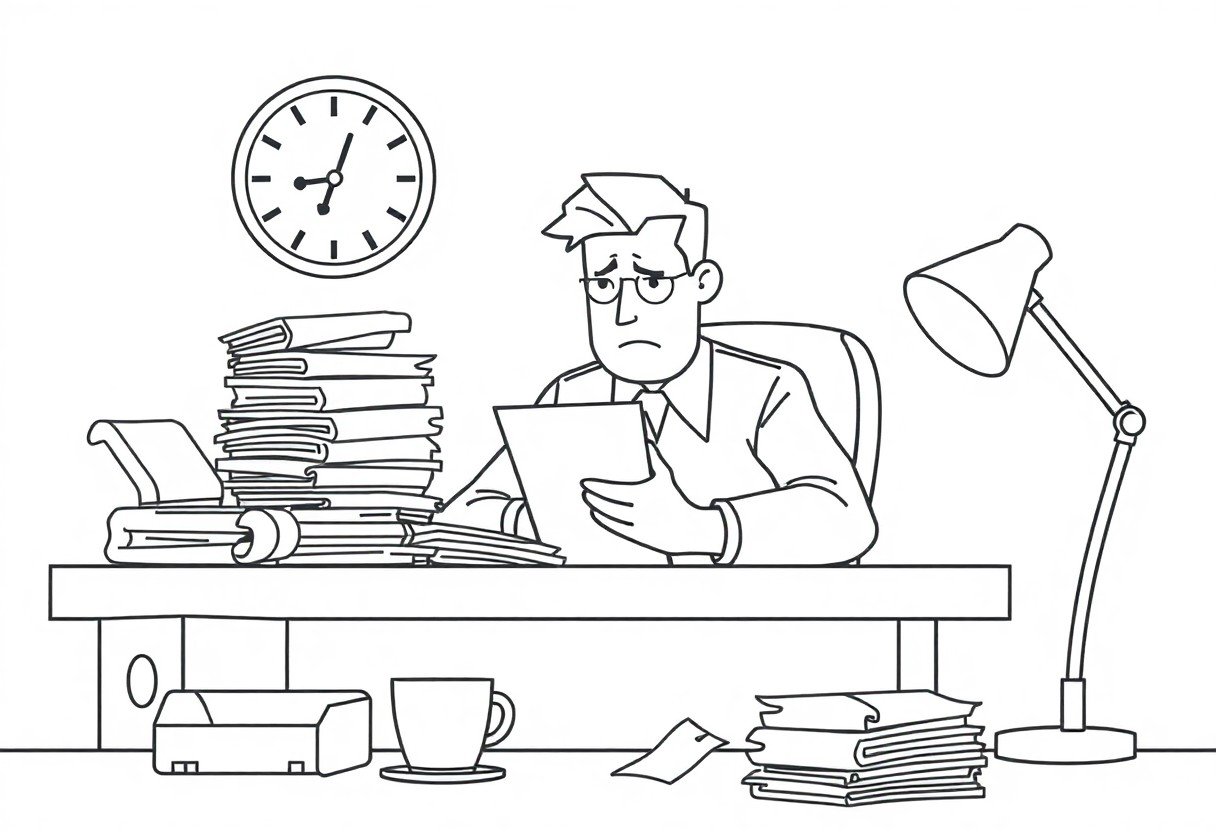Work Stress and Burnout in the UK
Many individuals in the UK experience high levels of work stress and burnout, which can severely impact your well-being and productivity. Understanding the signs and causes of these issues, particularly work stress and burnout in the UK, is necessary for you to take control of your mental health. This post will explore the factors contributing to work-related stress and the alarming statistics that underline its prevalence in the workplace. You’ll also find effective strategies to address these challenges, allowing you to create a healthier work-life balance and foster a more positive workplace environment.

Key Takeaways:
- Work-related stress and burnout have become increasingly prevalent in the UK, affecting workers’ mental and physical health.
- Factors contributing to work stress include high workloads, lack of support, and poor work-life balance.
- Organizations that prioritize employee well-being can see improved productivity and reduced absenteeism.
- Mental health resources and employee assistance programs are important for helping employees manage stress and prevent burnout.
- Raising awareness about stress and burnout is key to fostering a healthier workplace culture across various sectors.
Understanding Work Stress
For many individuals in the UK, work stress has become an increasingly common experience. Understanding what constitutes work stress is vital to effectively managing it. You may feel overwhelmed, anxious, or unable to meet the demands of your job, which can ultimately affect your physical and mental well-being.
Definition of Work Stress
Before you can tackle work stress, it’s important to define it. Work stress occurs when the pressures and demands of your job exceed your capacity to cope. This imbalance can lead to a range of negative emotional, psychological, and physical responses that can affect your overall quality of life.
Causes of Work Stress
By identifying the causes of work stress, you can take steps to alleviate it. Common causes include high workloads, tight deadlines, an unsupportive work environment, and job insecurity. These factors create a sense of pressure, which can lead to feelings of inadequacy and anxiety.
The Impact of Work Stress and Burnout in the UK
This is where stress can become dangerous to your well-being. High workloads and tight deadlines can rapidly escalate your feelings of being overwhelmed. An unsupportive work environment may leave you feeling isolated, while job insecurity can provoke chronic anxiety. Understanding these causes is crucial; addressing them proactively can lead to a more balanced work life and significantly enhance your mental health. By recognizing and managing these stressors, you can pave the way toward a more productive and fulfilling work experience.
Prevalence of Work Stress in the UK
While work-related stress is increasingly pervasive in the UK, many people find themselves grappling with the pressures of their jobs. The demands of modern work life, combined with economic uncertainties, contribute to a growing crisis that affects not only your professional life but also your personal wellbeing.
Statistics and Trends
At present, recent statistics show that approximately 40% of employees in the UK report experiencing work stress. This trend has escalated in recent years, highlighting a pressing need for workplaces to address the factors contributing to stress and promote healthier work environments.
Demographic Variations
Beside overall statistics, it’s important to recognize that work stress varies significantly among different demographics. Factors such as age, gender, and industry can influence your experience of stress at work, creating unique challenges that can affect your performance and mental health.
But understanding these variations is vital. For instance, younger workers often face higher levels of stress due to job insecurity, while women may experience additional stress from balancing work and family responsibilities. Furthermore, certain industries, such as healthcare and finance, report higher stress levels compared to others. By recognizing these factors, you can better equip yourself to cope with the specific challenges you face in your work environment.
The Impact of Work Stress on Health
Keep in mind that work stress can severely affect your health, leading to a range of mental and physical issues. Prolonged exposure to stress can contribute to various problems, including anxiety, depression, sleep disturbances, and heart disease. It’s vital to recognize the signs and take proactive steps to mitigate the effects, ensuring that your well-being remains a priority in the face of workplace demands.
Mental Health Consequences
Between increased anxiety levels and pervasive feelings of dread, stress can erode your mental health significantly. You may find yourself struggling with decision-making and experiencing mood swings, which can negatively affect your relationships both at work and at home. Recognizing these symptoms early can help you seek support and implement coping strategies effectively.
Physical Health Consequences
To compound the issue, stress doesn’t just take a toll on your mental state but can also lead to serious physical health issues. You may notice changes in your appetite, leading to weight gain or loss, increased susceptibility to illness, and elevated blood pressure. Chronic stress has been linked to heart disease and gastrointestinal problems, making it vital to address your stress levels before they escalate into more significant health concerns.
Even minor stress can accumulate over time and result in devastating effects on your physical health. Stress triggers the body to release hormones like cortisol, which can contribute to conditions such as obesity and diabetes. Additionally, stress can lead to muscle tension and pain, impacting mobility. Prioritizing stress management techniques, such as mindful practices or regular exercise, can help mitigate these negative outcomes and enhance your overall health.
Burnout: A Deeper Dive
Despite the growing awareness around workplace mental health, many people in the UK still experience burnout. This state of physical, emotional, and mental exhaustion stems from prolonged stress and can lead to significant declines in your overall well-being. Understanding the deeper implications of burnout is important for addressing its impact and fostering healthier work environments.
Definition and Symptoms of Burnout
An effective definition of burnout encompasses a triad of symptoms: overwhelming fatigue, reduced performance, and a sense of detachment from your work. You may notice chronic tiredness, feelings of cynicism, or emotional exhaustion that impacts not only your work but also your personal life.
Factors Contributing to Burnout
Above all, several factors can contribute to your experience of burnout, including:
- High workload
- Poor work-life balance
- Lack of control
- Unclear job expectations
- Insufficient support
Thou must recognize these elements to mitigate the risk of burnout in your professional life.
Another important aspect to consider is that the workplace culture can greatly impact your susceptibility to burnout. Environments that are highly competitive or those that lack empathy can exacerbate feelings of stress. Additionally, insufficient feedback and personal recognition can undermine your mental health, leading you to feel undervalued. Adjusting your expectations and advocating for a more positive workplace culture is imperative.
- Negative workplace culture
- Insufficient development opportunities
- Poor communication
Thou should take proactive steps to challenge these contributing factors for a healthier work-life balance.
Work Environment and Culture
Not all workplaces foster a supportive culture, which can greatly impact your mental health and productivity. If your work environment lacks respect, inclusivity, or adequate communication, it may lead to heightened feelings of stress and eventual burnout. A positive culture, on the other hand, encourages collaboration, reinforces a sense of belonging, and promotes open dialogue, which can significantly alleviate work-related pressures.
The Role of Management
At the core of any successful workplace is effective management. Your manager’s ability to provide clear expectations, constructive feedback, and adequate resources plays a vital role in reducing your stress levels. When management is approachable and supportive, you are more likely to feel valued and understood, leading to improved morale and lower chances of burnout.
Workplace Policies and Support Systems
Among the key factors that influence your well-being at work are the existing policies and support systems. These frameworks are designed to help you manage stress, offering resources like mental health days, flexible working arrangements, and access to counseling services.
Role of workplace policies and support systems cannot be understated. Effective policies provide guidelines that define acceptable behavior and processes for reporting concerns, contributing to a sense of safety. In addition, having support systems such as employee assistance programs ensures that you have access to mental health resources when needed. A well-rounded approach can significantly reduce the risk of burnout and create a healthier workplace culture that prioritizes your well-being and productivity.
Coping Mechanisms and Strategies
Your ability to cope with work stress and burnout significantly affects your overall well-being. Implementing effective coping mechanisms can enhance your resilience against stressors in the workplace. Adopting strategies such as time management, mindfulness practices, and setting clear boundaries between work and personal life can help alleviate feelings of overwhelm. Additionally, seeking social support from colleagues, friends, or family is vital as it provides a sense of connection and validation that can strengthen your mental fortitude.
Individual Coping Strategies
Between recognizing your stress triggers and actively addressing them, you can develop individual coping strategies that align with your lifestyle. Engaging in regular physical activity, practicing relaxation techniques, and ensuring a healthy work-life balance are effective ways to manage stress. It’s important to explore options that resonate with you, as they can enhance your emotional and psychological resilience.
Organizational Interventions
Below are various organizational interventions that can mitigate work-related stress and prevent burnout in employees. Companies can implement supportive policies, provide access to mental health resources, and foster a positive workplace culture. Training management to recognize signs of stress and burnout can be instrumental in creating an environment that prioritizes employee well-being.
Due to the increasing rates of burnout, organizations must adopt proactive measures to support their employees’ mental health. Providing employee assistance programs, flexible working arrangements, and regular mental health days can significantly reduce stress levels. Furthermore, promoting a culture of open communication and supportive leadership helps to create an atmosphere where employees feel valued. This not only improves employee morale but also enhances productivity, ultimately benefiting the organization as a whole. Ignoring these critical interventions can lead to a workforce that is disengaged and at risk for serious mental health challenges.
Conclusion
To wrap up, understanding work stress and burnout in the UK is vital for maintaining your well-being and productivity. You need to recognize the signs of burnout, implement effective coping strategies, and prioritize self-care. By fostering a healthier work environment and seeking support when needed, you can mitigate the impacts of stress and work towards a more balanced and fulfilling professional life.
FAQ
Q: What are the main causes of work stress and burnout in the UK?
A: The main causes of work stress and burnout in the UK include excessive workloads, lack of control over work, poor management practices, unclear job expectations, and inadequate support from colleagues and supervisors. Additionally, factors such as job insecurity, long hours, and the pressure to meet tight deadlines can contribute significantly to feelings of stress and burnout.
Q: How can individuals identify signs of work-related stress and burnout?
A: Individuals can identify signs of work-related stress and burnout by being aware of physical, emotional, and behavioral symptoms. These may include chronic fatigue, irritability, anxiety, decreased motivation, difficulty concentrating, and physical symptoms such as headaches or gastrointestinal issues. A noticeable change in work performance or relationships with coworkers can also be indicators of stress and burnout.
Q: What steps can employers take to reduce work stress and prevent burnout among employees?
A: Employers can take several steps to reduce work stress and prevent burnout, such as fostering a supportive work environment, promoting work-life balance, offering flexibility in work arrangements, and providing opportunities for professional development. Additionally, regular check-ins with employees, implementing mental health resources, and encouraging open communication can help identify and address stressors before they lead to burnout.
Q: Are there specific resources available for individuals dealing with work stress and burnout in the UK?
A: Yes, there are numerous resources available for individuals dealing with work stress and burnout in the UK. These include workplace Employee Assistance Programs (EAPs), mental health services through the National Health Service (NHS), and various non-profit organizations that provide support and counseling. Additionally, online resources and helplines can offer guidance and strategies for managing stress and burnout.
Q: What can individuals do to manage their work stress and prevent burnout?
A: Individuals can manage their work stress and prevent burnout by developing healthy coping strategies such as practicing mindfulness, engaging in regular physical activity, and maintaining a balanced diet. Setting boundaries between work and personal life, prioritizing self-care, and seeking social support from friends, family, or colleagues can also be beneficial. Furthermore, seeking professional help from a mental health professional can provide tailored strategies to cope with specific challenges.







